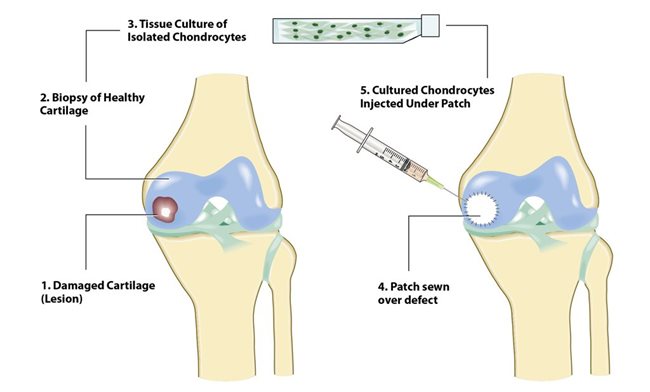Cartilage Cell Transplantation
RJAH is currently the only hospital in the UK to offer a type of cartilage cell transplantation procedure called Autologous Chondrocyte Implantation (ACI).
What is it?

Cartilage cell transplantation involves the removing of healthy cartilage cells from the patient's knee and growing them in culture, where they multiply at least 20 fold. The patient then has an operation to remove the damaged part of the cartilage and the cells are implanted in its place.
The cells anchor themselves to the bone within 24 hours - "growing" new cartilage at the damaged site. A patient can expect to resume everyday use in three months and full activities including sports, in twelve months. This development is important as previously the only alternative was knee replacement which for young patients is unsatisfactory.
RJAH ran trials for ACI over a 20-year period, the procedure finally winning approval for funding on the NHS from has won official approval from the National Institute for Clinical Excellence (NICE) to be funded by the NHS in October 2017.
It has been working in partnership with Keele University and RJAH, with the trio setting up the Oscell Cell Manufacturing Facility to produce the chondrocytes.
We are grateful to the support we have had over that time from a number of sources, including the charity Arthritis Research UK as well as Medical Research UK and the Orthopaedic Institute.
The use of ACI at RJAH were first pioneered by the legendary Professor James Richardson, who spent 20 years leading trials before the procedure won NICE approval. He was still leading research into developing the technique right up to his untimely passing in February 2018.
Procedures are still performed at RJAH by experienced Consultant Orthopaedic Surgeons: Mr Pete Gallacher, Mr Paul Jermin and Mr Andrew Barnett.
Who is eligible?
ACI can only be offered to patients who meet a number of defined criteria as set out by NICE in their guidance note TA477, which can be read here.
These criteria include that the patient must not have had previous surgery to repair articular cartilage defects, as evidence from previous trials has shown ACI to be much less effective in these cases.
There should also be minimal osteoarthritic damage to the knee and the defect should be over two square centimetres.
RJAH accepts patients from across the UK. It is important they have the support of their orthopaedic surgeon and an MRI which confirms the diagnosis and satisfies the criteria.